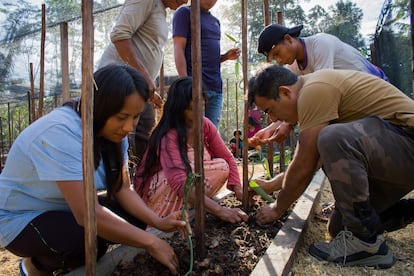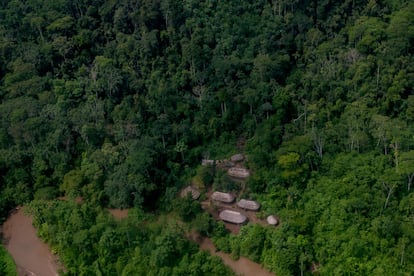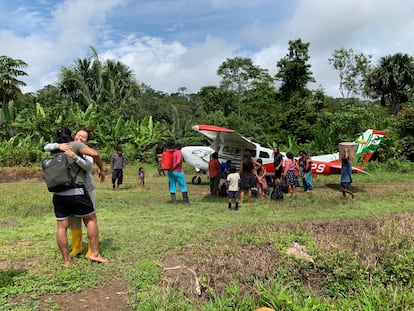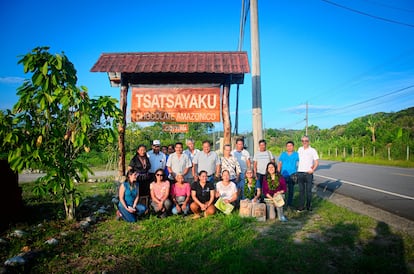Can the bioeconomy replace oil extraction in the Ecuadorian Amazon?
The petroleum industry has provided little benefit for local communities, who are now driving an ecological transition by sustainably tapping the wealth of the jungle

Deep in the Amazon jungle, near the border between Ecuador and Peru, Gloria, a Sapara indigenous leader, performs a welcoming ceremony for a group of tourists. She stands in front of a small traditional hut adorned with thatch, her face painted with figures representing her connection to nature and her ancestors, clutching a tobacco leaf. “We are here, in Naku, sharing our traditions and knowledge with you to preserve our culture and show the world that it is possible to live free of extractivism,” she says in a serene voice. The Sapara are one of Ecuador’s 11 Amazonian nationalities, a group declared Intangible Cultural Heritage by UNESCO. However, they are in danger of disappearing due, among other things, to oil exploitation.
To resist the challenges they face, the Sapara created Naku, an ecotourism center dedicated to protecting the rainforest, sharing their worldview, and generating economic resources in a sustainable way. To reach Naku from Ecuador’s capital, visitors must travel 150 kilometers (93 miles) from Quito to Shell, and then take a two-day jungle hike or a short flight. Once there, tourists interact with the community, swim in rivers, hike and participate in traditional ceremonies.
Naku exemplifies the Amazonian communities’ attempt to seek alternatives for ecological transition through bioeconomy: by taking advantage of the Amazon’s wealth in a responsible manner. The project employs more than 30 families and allocates the income generated to a common fund to finance education and provide health care services.

The oil economy’s missed opportunity
In Ecuador, 194 million barrels of crude oil are extracted each year, generating profits in excess of $7 billion. But despite representing a third of the country’s economy, in the Amazon, the economic benefits have not reached the communities surrounding the oilfields, where more than half of the population lives in poverty. In addition, oil extraction has caused serious damage, including spills and widespread contamination.
Economist Alberto Acosta, who worked in the state oil company, Petroecuador, says he used to firmly believe that oil “was the solution to lift Ecuador out of poverty.” However, after serving as Minister of Energy and Mines, he now says he has seen “the monster from the inside” and witnessed “the destruction caused by hydrocarbon activity.” As a result, Acosta’s perspective has changed and he now firmly believes in the possibility of generating alternative economies.
There are an increasing number of ventures focused on the bioeconomy in Ecuador, such as ecotourism, a growing industry that moved more than $180 billion globally in 2019 and is estimated to reach more than $330 billion by 2027. The Pachamama Foundation supports these projects in Ecuador through its Forest Economies program. According to Pablo Balarezo, coordinator of the program, “ecotourism projects are the most successful in promoting the bioeconomy.” Given the country’s unique biodiversity, he believes that “there are ample opportunities for this industry to become an alternative comparable to oil activity in the future.”

Another successful example of sustainable enterprise is vanilla, grown mainly by 300 producers from the Kichwa communities of the Kallari cooperative in Napo province. This orchid, considered the second-most expensive plant in the world, has found increasing demand in countries including the United States, Lithuania, Canada, the Czech Republic, and Panama.
Fetching over $500 per kilo, vanilla cultivation is carried out by Amazonian women, to whom the Pachamama Foundation provides training. For Belén Páez, director of the foundation, the success of these projects “depends on the joint collaboration of NGOs, indigenous peoples, academia, local governments and the private sector.” Several projects have attracted the interest of international investors, who are seeking to become part of these value chains. The Chakra project, financed by the French Development Agency (AFD), is promoting the development of vanilla production, which also produces derivatives used in chocolates and cosmetic products.
Another product that has shown great economic potential is guayusa, a plant rich in caffeine, antioxidants and which possesses medicinal properties. The Tsatsayaku association of small producers is dedicated to its agroecological production, contributing to the export of more than 120 tons per year to countries such as the United States, Canada, and New Zealand. According to the Ministry of Production, exports have generated more than $3 million a year, making Ecuador the world’s leading supplier. It also boosts the development of thousands of indigenous families. In 2022, the country established the Guayusa Export Promotion Consortium, an alliance to explore specific markets and share promotion and logistics costs among participating companies.
The Tsatsayaku association not only produces guayusa, but also coffee. Ecuador has achieved notable success in exporting coffee and cocoa, becoming the leading exporter of cocoa beans in the Americas. It also ranks fourth in the world, posting an increase of 168% in the last 10 years. In 2020 alone, coffee exports generated $68.5 million, while cocoa exports reached $850 million.

Is the bioeconomy a genuine alternative?
Despite warnings from the scientific community over the need to protect biodiversity, Ecuador continues to look to oil as an economic solution. However, a report by British Petroleum shows that the country could exhaust its reserves in fewer than eight years.
After half a century of exploitation “poverty persists in Ecuador and oil is running out,” says Carlos Larrea, a researcher at the Simón Bolívar Andean University. Larrea adds it is fundamental to seek alternatives and make an energy transition to a post-extractive society, highlighting the importance of biodiversity. He proposes ecotourism, sustainable agriculture, fair green trade, and the transition to renewable energies as key economic alternatives for the country.
But there is still a long way to go. Although the bioeconomy has shown positive results, it cannot yet come close in economic terms to the profits of an oil-based economy. Moreover, it faces challenges due to a lack of institutional support and competition with extraction companies that result in communities being “forced to work in them to cover their basic needs due to the lack of state attention,” says Balarezo.
However, Páez maintains that the bioeconomy is a viable solution that is experiencing steady growth. “In just two years, in a territory of 400,000 hectares, more than 1,200 families have received income that has created a significant change in their households,” she says, referring to vanilla cultivation. For her, the bioeconomy represents the dawn of new opportunities “not only for the future of the Amazon, but for all of humanity.”
Sign up for our weekly newsletter to get more English-language news coverage from EL PAÍS USA Edition
Tu suscripción se está usando en otro dispositivo
¿Quieres añadir otro usuario a tu suscripción?
Si continúas leyendo en este dispositivo, no se podrá leer en el otro.
FlechaTu suscripción se está usando en otro dispositivo y solo puedes acceder a EL PAÍS desde un dispositivo a la vez.
Si quieres compartir tu cuenta, cambia tu suscripción a la modalidad Premium, así podrás añadir otro usuario. Cada uno accederá con su propia cuenta de email, lo que os permitirá personalizar vuestra experiencia en EL PAÍS.
¿Tienes una suscripción de empresa? Accede aquí para contratar más cuentas.
En el caso de no saber quién está usando tu cuenta, te recomendamos cambiar tu contraseña aquí.
Si decides continuar compartiendo tu cuenta, este mensaje se mostrará en tu dispositivo y en el de la otra persona que está usando tu cuenta de forma indefinida, afectando a tu experiencia de lectura. Puedes consultar aquí los términos y condiciones de la suscripción digital.








































